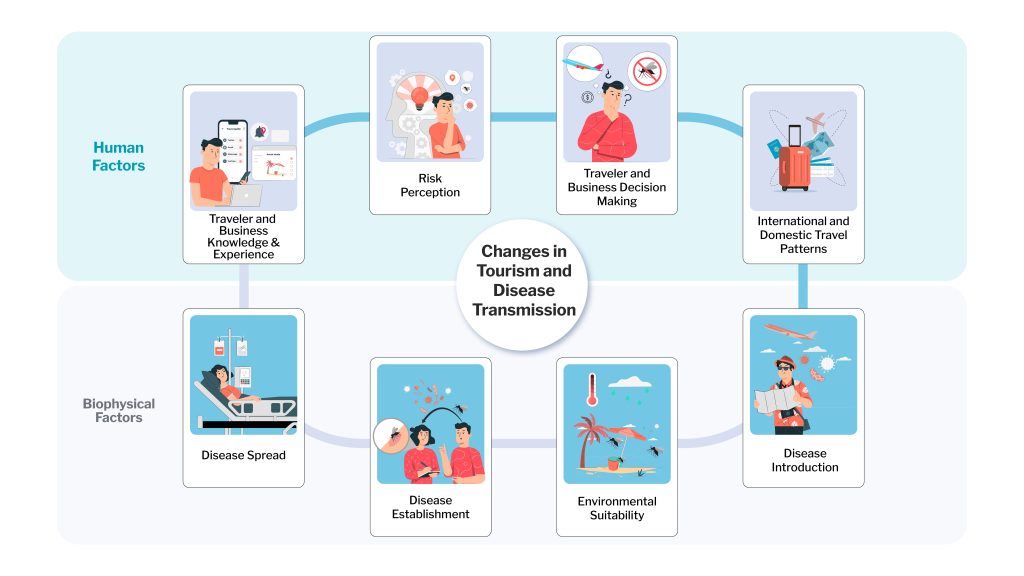About us
[Español]
Download our project factsheet
Focusing on the Americas, this NSF-funded research project examines the relationships among the spread of mosquito-transmitted diseases, perceptions of disease risk, and human travel. The movement of infected humans has the potential to spark global epidemics of poorly-known mosquito-borne diseases, similar to those that occurred in the Americas following the first detection of chikungunya and Zika viruses in 2013 and 2015, respectively. Researchers from the University of Maine and University of Illinois Urbana-Champaign investigated the contribution of human movement patterns to mosquito-human interactions and to the spread of mosquito-borne viruses across regions (from local to continental distances). The project explored how infectious disease outbreaks influence the decisions of individuals to travel, as well as marketing strategies of tourism businesses. The team also looked at how changes in human mobility in response to outbreaks and marketing might alter outbreak paths. The project benefits society by offering interdisciplinary education and training opportunities in disease ecology, mathematics, and geographic information science for undergraduates, graduate students, and post-doctoral researchers in the United States. Upcoming participatory workshops with public health and tourism stakeholders will seek to develop management strategies and actions to address mosquito-borne disease threats. The data sets developed as part of the project will be made available through public repositories accompanied by online and face-to-face educational workshops.
The project uses epidemiological modeling and data science techniques to model human movements and their impact on outbreaks of mosquito-borne diseases (i.e., chikungunya and Zika viruses) from hemispheric to local spatial scales using a rich stream of information sources (e.g., mobile phone and social media data). In particular, the researchers evaluate the significance of the most traveled routes of real human mobility networks (i.e., the network backbone) as potential dispersal pathways for mosquito-borne viruses, and assess the ability of theoretical indicators of vital network nodes (e.g., most connected cities and countries) to predict the occurrence of super-spreading hubs of high transmission during the recent outbreaks of Zika and chikungunya. This research incorporates human mobility as a parameter in predictive models for mosquito-borne disease risk. The results are integrated with a social science mixed methods research approach to represent how outbreaks of infectious disease, together with associated travel warnings and changes in tourism marketing, influence individual travelers’ movement choices and how these choices scale up to alter the trajectory of epidemics. The consideration of mosquito-borne disease emergence and international and domestic tourism as a coupled natural-human system will allow the researchers to assess the efficacy of different intervention strategies to inhibit transmission, the impacts of knowledge of mosquito control efforts on the health risk perceptions of travelers and tourism companies, and the potential for altered travel patterns in response to disease risk perceptions to influence the spatio-temporal trajectory of an epidemic.

For more information, please visit the National Science Foundation Grant # 1824961
External Media
UMaine gets grant to study mosquito-borne viruses, tourism
Disease risk and human travel research
Mosquitoes Brought Me to Maine: Reflections of a One Health REU Student
